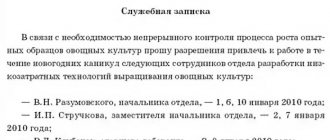Home page » Labor law » Is it possible to send an employee on leave without his consent?
Vacation without the consent of the employee - every year this topic becomes a stumbling block for many employers and employees. Ignorance by employees of their rights and abuse of this by managers gives rise to many conflicts on this basis.
- Can an employer create a vacation schedule without the employee’s consent?
- The employee has unpaid leave. Can the employer send him on vacation without consent?
- Can an employer divide vacation into parts without the employee’s consent?
- Can an employer reschedule leave without the employee’s consent?
- Can an employer recall from leave without the employee’s consent?
The boss interrupted the vacation without the employee’s consent - isn’t this a violation of the laws of the Labor Code of the Russian Federation?
The answer to this and other “vacation” questions can be obtained by reading this article.
Content:
In what situations is leave at your own expense used?
What to do and where to complain if your job requires you to go on unpaid leave due to the crisis and the coronavirus situation
I'll be as honest as possible. The situation now is really VERY DIFFICULT. And I personally know many entrepreneurs who would be happy to maintain both their staff and their salaries. If they had such an opportunity... And if the employer now really has nothing to pay you a salary, and out of spite you want him to be punished, then you should think about the fact that tomorrow the employer will go bankrupt (and the situation is really deplorable...), and you will remain no work at all. Otherwise, there would be a chance to be patient a little and return to your previous place of work.
Can an employer create a vacation schedule without the employee’s consent?
The vacation schedule is drawn up by the head of the organization before the start of each calendar year and must ensure the normal operation of the organization, therefore the number of employees who can go on vacation at the same time is determined at the local level.
At the same time, you need to know that the law defines a category of workers who can independently determine the timing of their vacation.
These include:
- minor employees;
- women who have at least two children under 12 years of age;
- men who are raising at least two children under 12 years of age alone;
- guardians or trustees of children;
- veterans and disabled combat veterans;
- Heroes of the Soviet Union and the Russian Federation, etc.
That is, according to the law, only the opinions of these employees must be taken into account. The wishes of other employees can be fulfilled if possible.
In what situations is leave at your own expense used?
Let's start with the fact that no one can send you on unpaid leave without an appropriate application at your own request. If you have not expressed a desire, but they tactfully hint to you that this needs to be done, then you can safely ignore these hints. By the way, direct instructions too.
The Labor Code of the Russian Federation contains Article 128. Leave without pay, which clearly states the procedure for providing unpaid leave. And the main thing you need to know: vacation at your own expense is not the employee’s obligation, but his right. If an employee does not want to go on unpaid leave, then no one can force anyone out.
Related article: Employer does not allow weekend leave by presidential decree (for quarantine)
If the situation is truly a crisis, they cannot transfer you to remote work because you simply cannot do anything there, and the employer frankly has nothing to occupy you with, then this situation is regulated by Art. 157 of the Labor Code of the Russian Federation (Payment for downtime). And in this case, the employer is obliged to pay you at least 2/3 of your current salary in accordance with the downtime. If the downtime lasts a month, as is the case with these “coronavirus holidays,” then you are required to pay at least 2/3 of your monthly salary.
An elementary example: production, the workshop is overflowing with goods. They couldn’t sell out, and there’s no point in producing additional product in the next couple of weeks. And workers go to work, but they can’t just go! Since they don’t seem to be needed for some time, the cunning boss decides to offer them a vacation at his own expense for a couple of weeks. And they won’t be an eyesore, and they won’t undermine labor discipline with their idleness, and you won’t have to pay wages either. And there the warehouses will be reloaded, and production will start working again.
What else you need to know
In addition to all of the above, there are many more nuances in this issue for both sides. Of course, each participant tries to protect, first of all, their interests. But our task is to tell you how to do the right thing (according to real legal requirements).
Forced leave or layoff
As we have already found out, the employer does not have the right to manage the time of employees at its own discretion.
However, employees must also treat their obligations in good faith. Failure to go on vacation according to the approved schedule can be regarded as a disciplinary offense, since there is a violation of the company’s internal regulations. As a last resort, the employer can use this procedure in the fight against unscrupulous employees.
As for unpaid leave, the opposite is true. It is the employee's right to apply for such leave. But if he does not submit an application, it means he does not want to exercise this right. And the employer has no right to force him.
Now about staff reductions: companies often resort to this procedure when employees do not want to go on long-term voluntary-forced leave without pay. If the legal requirements and guarantees established by the Labor Code for laid-off workers are not met, the layoff can be appealed administratively and challenged in court.
Important! Staff are notified of the upcoming layoff at least 2 months before the event.
Who will be sent on vacation anyway?
In accordance with the provisions of Art. 124 of the Labor Code, it is legally prohibited not to provide annual standard leave within 2 years in a row, as well as at least once a year to the following employees:
- under 18 years of age;
- working in harmful/dangerous working conditions.
For failure to comply with the established rule, the employer faces administrative punishment in accordance with Part 1 of Art. 5.27 of the Code of Administrative Offenses of the Russian Federation, a fine of 30,000 to 50,000 rubles may be imposed on a company. Consequently, the company management cannot follow the lead of an ordinary employee for 2 years or workers from a special category (at least once).
Download for viewing and printing:
Article 124 of the Labor Code of the Russian Federation “Extension or transfer of annual paid leave”
Decor
When taking unpaid leave for any reason, the employer is required to competently complete the documentation. The basis for holding the event is the personal initiative of the employee. The procedure is executed in accordance with the algorithm:
- conducting negotiations between the employer and employees;
- filling out an application from an employee reflecting a request for additional rest time;
- the employer imposing a resolution on the application to make a positive decision in response to the employee’s request;
- issuing an order for each employee to grant leave, indicating its terms;
- familiarization of employees, against signature, with internal administrative documentation concerning the justification for their absence from the workplace during the period of unpaid leave.
Forced downtime due to coronavirus: how to register?
Many Russian companies, especially those working in the fields of tourism, holding public events, etc., are now forced to introduce temporary downtime due to the risks of the spread of coronavirus infection, that is, independent of the parties to the labor relationship. The reason for the suspension of production may also be interruptions in the supply of various components from China.
The risks of suspension cannot be excluded in cases where the functioning of the company is impossible due to illness of employees or when they are in quarantine due to the threat of coronavirus - in this case, employees are required to receive paid sick leave.
If a person is not sick or his work in quarantine cannot be organized remotely, the company can transfer the employee to idle mode.
Let us note that the employer has the right to oblige employees to be at work during downtime, since downtime is not a type of rest time (Article 107 of the Labor Code of the Russian Federation). But given the risks of spreading the virus, this is an unlikely scenario.
To register forced downtime, the management of the employing company must:
1. Issue an order (most often it is called an order “On the duration of downtime and its payment”).
The document must reflect:
- who is affected by the downtime regime (this can be either the entire enterprise or individual employees);
- reasons for downtime;
- start and end times of the downtime period;
- the amount of payment to employees during downtime;
- whether workers should be on the territory of the enterprise during downtime or not.
Those employees to whom it applies should familiarize themselves with the order.
2. Within three working days from the date of introduction of downtime, send a notification about it to the territorial division of the Labor Inspectorate (clause 2 of Article 25 of the Employment Law of April 19, 1991 No. 1032-1).
The notification states:
- reason for downtime;
- details of the downtime order;
- downtime;
- the number of employees to whom the order is extended.
During the entire period of downtime, a time sheet is kept. In it, days of downtime, which are not the fault of the employer or employee, are reflected for each employee using the code “NP” or “32”. The spread of coronavirus is an emergency situation, obviously not due to the fault of any of the parties to the employment relationship.
Payment for “forced leave”—downtime for which neither the employer nor the employee is to blame—is at least 2/3 of the employee’s salary or tariff rate, calculated in proportion to the downtime (Article 157 of the Labor Code of the Russian Federation).
Note that if the downtime is due to purely internal economic reasons, that is, when external factors did not play a significant role, it can be recognized as downtime due to the fault of the employer (]]>Appeal ruling of the Vladimir Regional Court dated October 31, 2013 No. 33-3566/2013] ]>). Such downtime is paid in the amount of 2/3 of a person’s average earnings, which may include not only salary, but also bonuses, allowances, etc.
How to send an employee on leave without pay
Downtime order
If a business entity is experiencing financial difficulties, or the current circumstances make it impossible for employees to fulfill their labor obligations in the workplace, then the only way for the employer to solve the problem situation is to reach an agreement with the employees. Since the relationship between the employer and employees is based on a voluntary agreement formalized in the form of a contract, it is usually not difficult to reach an agreement.
Can an employer divide vacation into parts without the employee’s consent?
All full-time employees, that is, those working under an employment contract, have the right to receive leave.
Moreover, you can take your first vacation after six months of work. And even earlier, if the enterprise administration does not object.
It is worth noting that vacation is given specifically for the working year, which begins from the date of employment.
It is not necessary to use the entire vacation; you can divide it into parts if this suits both parties.
Moreover, you can split your vacation any way you like; the obligatory condition is that one part must be at least 14 days, and the rest can be taken at least one day at a time if the administration agrees.
If an employee wishes to “split” his vacation, he should submit a corresponding application. If this is the desire of the administration, the employee must be notified about this in writing.
But in both cases, the division of vacation is carried out only by mutual agreement.
The essence of paid annual leave
The paid rest days provided every year are a period when the employee does not work, but retains his place of work and average salary.
The duration of the vacation must be at least twenty-eight days. This is enshrined in Article 115 of the Russian Labor Code. The rest schedule for employees is drawn up fourteen days before the end of the current year for the next annual working period. The head of the organization is obliged to familiarize the staff with the drawn up plan against signature.
When drawing up a schedule, the employer is not obliged to take into account the wishes of employees about the time they go on vacation (whether this or that team member wants to rest in winter or summer).
Exceptions are made only for certain categories of workers (parents with three or more children, women with children under fourteen years old, disabled people, etc.). A complete list of such employees is enshrined in the articles of the Labor Code of the Russian Federation (Chapter 19. LEAVES).
Before sending a member of the workforce on vacation, the head of the enterprise is obliged to notify the employee in writing two weeks before the start of the rest period.
In addition to the written notice, the employer must draw up an order, which is also read against signature. Three calendar days before the start of the vacation, the organization’s accounting department is required to pay the employee vacation pay.
Even if the employer has not fulfilled the obligation to draw up a vacation schedule in a timely manner, he must provide employees with rest days.
Vacation at someone else's request. Does the employer have the right to send or not to send on vacation?
October 27, 2020, 08:00
This material is also available in Ukrainian
Joergelman/Pixabay
Joergelman/Pixabay
Author: Anastasia Kotova
Vacation is an employee’s right to rest, and not an obligation that the employer can enforce. Lawyers explain how to use this right
The events of the last two years in Ukraine have also influenced the situation on the labor market, forcing employed citizens to hold on to their jobs more tightly. The trend shows that every year more and more Ukrainians decide not to go on vacation, because they believe that their absence, even short-term, from the workplace can lead to job loss. Sometimes employers force employees to go on vacation during the New Year or May holidays. In addition, some workers see compensation for unused vacation days as often necessary additional revenue for the family budget. Employers, for their part, try to prevent such situations by motivating or forcing employees to exercise their right to rest on time. NV asked the lawyers to explain whether the employer has the right to force employees to go on vacation at a time convenient for the company, to require them to use their allotted vacation days at one time or another, or not to compensate them for unused vacation.
Annual paid leave is one of the social guarantees provided to all officially employed persons without exception. As a general rule, each employee has the right to 24 calendar days of vacation during the year, starting from the day of employment.
By its nature, vacation is a state-guaranteed right of a working person to rest. The exercise of such a right is voluntary, but at the same time it occurs according to clearly defined rules.
In practice, there are cases when an employer puts pressure on an employee and encourages the latter to use vacation at a time convenient for the employer. Formally, the employer does not have any mechanisms to force an employee to go on vacation, but informal events sometimes turn out to be more convincing than legal ones. Verbal demands, threats of reprimands, complaints to senior management or opposition to the team - as a rule, such actions on the part of the employer lead to the fact that the employee does not even try to defend his rights, but unquestioningly carries out the will of the employer.
Below you will find practical advice and answers to key questions regarding an employee's rights and responsibilities regarding leave management.
Question: Does an employer have the right to force an employee to go on vacation?
Answer: No
The timing and duration of vacations must be agreed upon between the employer and employee, taking into account the interests and capabilities of both parties. The only current restriction that does not allow an employee to arbitrarily determine the period of the vacation period is the order of vacations approved by the company.
In Article 10 of the Law of Ukraine On Leave (hereinafter referred to as the Law)
the priority for granting vacations is established, determined by schedules that are approved by the employer and brought to the attention of all employees.
It is worth noting that the lack of an approved vacation schedule in a company is a minor administrative offense, so in practice not all employers comply with this legal requirement. So, in companies where a schedule is not drawn up, the employer does not even have this formal leverage over the employee’s vacation activity.
The position of the Law here is clear: vacation planning is the result of an agreement between the employee and the employer, therefore coercion and orders do not apply to this category of legal relations, and the employer does not have the legal right to force the employee to go on vacation.
Question: Can an employer lawfully reprimand or fire an employee for refusing to take vacation time within the period proposed by the employer?
Answer: No
Labor Code (hereinafter referred to as the Code)
provides a clear and comprehensive list of grounds for dismissing an employee and issuing a reprimand. An employee’s refusal to go on vacation is not grounds for any of the above-mentioned disciplinary sanctions.
Article 40 of the Code, which defines the grounds for termination of an employment contract at the initiative of the employer, does not contain a provision on the employee’s refusal to go on vacation. Any hints or threats about possible dismissal from the employer if the employee refuses to take leave are unfounded and illegal.
An employee’s refusal to offer to go on vacation under no circumstances can be classified as a violation of labor discipline.
An employer's demand/request/recommendation for leave is not actually an order from the employer. An order is an act of unilateral expression of will, and as we noted earlier, issues regarding vacations are resolved by agreement and cannot be the result of a unilateral act of expression of will.
Therefore, if an employee refuses to go on vacation, the employer’s reprimand or dismissal of such an employee is unlawful.
Question:
What happens to unused vacation days this year?
Answer: They are carried over to the next year with a two-year limit.
Unused days of basic annual leave and additional leave are not cancelled. Ukrainian legislation does not provide for such a mechanism at all. Therefore, any slightest hint from the employer that the unused vacation days of the next year will “disappear” or “go somewhere else” are groundless and false.
According to Article 12 of the Law, annual leave in full or its unused part must be provided to the employee before the end of the working year, but no later than 12 months after the end of the working year for which such leave is granted. This means that unused vacation days are carried over to the next year.
Depending on the circumstances, there are several possible scenarios for using accrued vacation time.
Scenario 1. If the employment relationship with the employer is terminated
If an employee is dismissed, he is paid monetary compensation for all unused days of annual leave in accordance with the requirements of Article 24 of the Law. The legislator does not limit the number of unused vacation days subject to compensation, therefore monetary compensation is paid for all days, regardless of their number.
Scenario 2. If
an employee has, for example, 36 unused vacation days accumulated over several years and would like to use them within one year,
the law provides for an upper limit on vacation days within one year - the total duration of annual basic and additional vacations cannot exceed 59 calendar days.
However, if the employer wishes to use 59 days of vacation in a row, the employer may have reasonable objections and may try to limit or divide the number of vacation days into parts to ensure the smooth operation of the enterprise.
Question: Does an employee have the right to demand monetary compensation for unused days of accrued vacation?
Answer: Yes
Let us note that Article 2 of the Law allows, at the request of the employee, to replace vacation with monetary compensation. This means that the employer does not have the right, at his own discretion, to replace vacation with monetary compensation, but the employee has the right to ask for such a replacement. However, persons under 18 years of age are prohibited from making such a substitution in any case.
Evgenia Galamasyuk and Anastasia Kotova are lawyers at Marchenko Danevych.











